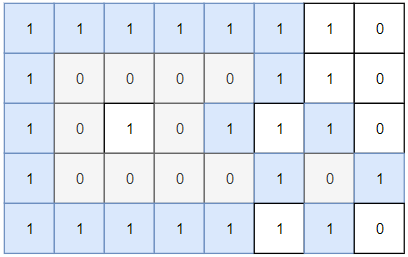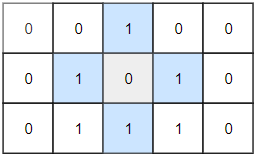1254. Number of Closed Islands #
题目 #
Given a 2D grid consists of 0s (land) and 1s (water). An island is a maximal 4-directionally connected group of 0s and a closed island is an island totally (all left, top, right, bottom) surrounded by 1s.
Return the number of closed islands.
Example 1:

Input: grid = [[1,1,1,1,1,1,1,0],[1,0,0,0,0,1,1,0],[1,0,1,0,1,1,1,0],[1,0,0,0,0,1,0,1],[1,1,1,1,1,1,1,0]]
Output: 2
Explanation:
Islands in gray are closed because they are completely surrounded by water (group of 1s).
Example 2:

Input: grid = [[0,0,1,0,0],[0,1,0,1,0],[0,1,1,1,0]]
Output: 1
Example 3:
Input: grid = [[1,1,1,1,1,1,1],
[1,0,0,0,0,0,1],
[1,0,1,1,1,0,1],
[1,0,1,0,1,0,1],
[1,0,1,1,1,0,1],
[1,0,0,0,0,0,1],
[1,1,1,1,1,1,1]]
Output: 2
Constraints:
1 <= grid.length, grid[0].length <= 1000 <= grid[i][j] <=1
题目大意 #
有一个二维矩阵 grid ,每个位置要么是陆地(记号为 0 )要么是水域(记号为 1 )。我们从一块陆地出发,每次可以往上下左右 4 个方向相邻区域走,能走到的所有陆地区域,我们将其称为一座「岛屿」。如果一座岛屿 完全 由水域包围,即陆地边缘上下左右所有相邻区域都是水域,那么我们将其称为 「封闭岛屿」。请返回封闭岛屿的数目。
提示:
- 1 <= grid.length, grid[0].length <= 100
- 0 <= grid[i][j] <=1
解题思路 #
- 给出一个地图,1 代表海水,0 代表陆地。要求找出四周都是海水的陆地的总个数。
- 这一题和第 200 题解题思路完全一致。只不过这一题要求必须四周都是海水,第 200 题的陆地可以是靠着地图边缘的。在此题中,靠着地图边缘的陆地不能最终计数到结果中。
代码 #
package leetcode
func closedIsland(grid [][]int) int {
m := len(grid)
if m == 0 {
return 0
}
n := len(grid[0])
if n == 0 {
return 0
}
res, visited := 0, make([][]bool, m)
for i := 0; i < m; i++ {
visited[i] = make([]bool, n)
}
for i := 0; i < m; i++ {
for j := 0; j < n; j++ {
isEdge := false
if grid[i][j] == 0 && !visited[i][j] {
checkIslands(grid, &visited, i, j, &isEdge)
if !isEdge {
res++
}
}
}
}
return res
}
func checkIslands(grid [][]int, visited *[][]bool, x, y int, isEdge *bool) {
if (x == 0 || x == len(grid)-1 || y == 0 || y == len(grid[0])-1) && grid[x][y] == 0 {
*isEdge = true
}
(*visited)[x][y] = true
for i := 0; i < 4; i++ {
nx := x + dir[i][0]
ny := y + dir[i][1]
if isIntInBoard(grid, nx, ny) && !(*visited)[nx][ny] && grid[nx][ny] == 0 {
checkIslands(grid, visited, nx, ny, isEdge)
}
}
*isEdge = *isEdge || false
}
func isIntInBoard(board [][]int, x, y int) bool {
return x >= 0 && x < len(board) && y >= 0 && y < len(board[0])
}